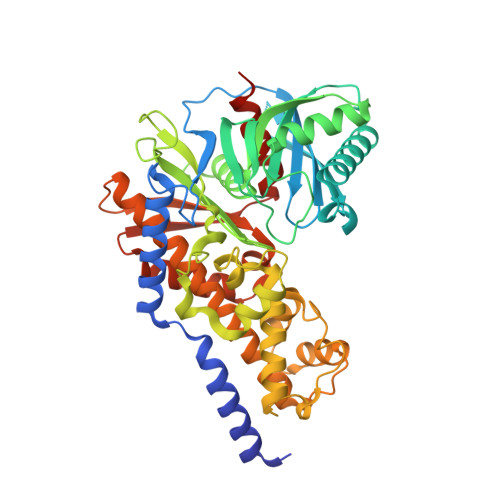Insights into Mechanism of Glucokinase Activation: OBSERVATION OF MULTIPLE DISTINCT PROTEIN CONFORMATIONS.
Liu, S., Ammirati, M.J., Song, X., Knafels, J.D., Zhang, J., Greasley, S.E., Pfefferkorn, J.A., Qiu, X.(2012) J Biological Chem 287: 13598-13610
- PubMed: 22298776
- DOI: https://doi.org/10.1074/jbc.M111.274126
- Primary Citation of Related Structures:
3VEV, 3VEY, 3VF6, 4DCH, 4DHY - PubMed Abstract:
Human glucokinase (GK) is a principal regulating sensor of plasma glucose levels. Mutations that inactivate GK are linked to diabetes, and mutations that activate it are associated with hypoglycemia. Unique kinetic properties equip GK for its regulatory role: although it has weak basal affinity for glucose, positive cooperativity in its binding of glucose causes a rapid increase in catalytic activity when plasma glucose concentrations rise above euglycemic levels. In clinical trials, small molecule GK activators (GKAs) have been efficacious in lowering plasma glucose and enhancing glucose-stimulated insulin secretion, but they carry a risk of overly activating GK and causing hypoglycemia. The theoretical models proposed to date attribute the positive cooperativity of GK to the existence of distinct protein conformations that interconvert slowly and exhibit different affinities for glucose. Here we report the respective crystal structures of the catalytic complex of GK and of a GK-glucose complex in a wide open conformation. To assess conformations of GK in solution, we also carried out small angle x-ray scattering experiments. The results showed that glucose dose-dependently converts GK from an apo conformation to an active open conformation. Compared with wild type GK, activating mutants required notably lower concentrations of glucose to be converted to the active open conformation. GKAs decreased the level of glucose required for GK activation, and different compounds demonstrated distinct activation profiles. These results lead us to propose a modified mnemonic model to explain cooperativity in GK. Our findings may offer new approaches for designing GKAs with reduced hypoglycemic risk.
- Structural Biology and Biophysics, Pfizer Groton Laboratories, Groton, Connecticut 06340, USA. shenping.liu@pfizer.com
Organizational Affiliation:



















